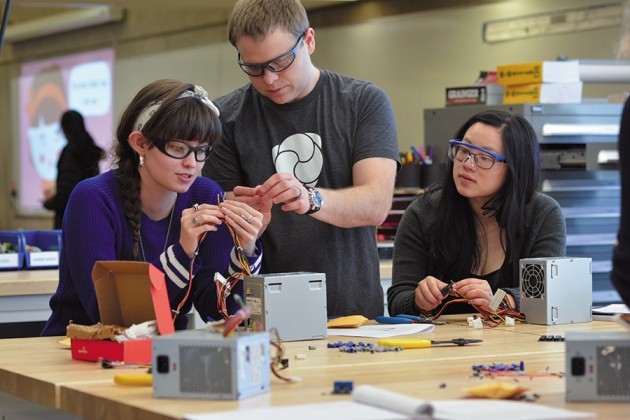
JAKARTA, inca.ac.id – As an experienced blogger passionate about education, I’ve spent countless hours diving into the science of learning and how it can transform the university experience. Whether you’re a fresh-faced freshman or a seasoned senior, understanding how we learn can be a game-changer in your academic journey. In this article, I’m excited to share some valuable insights from educational research that can help you study smarter, avoid common mistakes, and ultimately achieve your goals.
Understanding the Science of Learning

At its core, the science of learning examines how we acquire, retain, and apply knowledge. Researchers in this field explore various aspects of cognition, motivation, and the learning environment. By leveraging these insights, you can tailor your study strategies to fit your unique learning style and improve your academic performance.
One of the most fascinating findings in educational research is the concept of metacognition—essentially, thinking about your own thinking. Being aware of how you learn can help you identify effective study techniques and recognize when you need to adjust your approach. For example, if you realize that you struggle with memorizing information through passive reading, you might switch to active learning methods, such as summarizing what you’ve read or teaching the material to someone else.
Effective Learning Strategies
- Active Learning: Engaging with the material is crucial. Instead of just reading your textbooks, try to interact with the content. This can include discussing topics with classmates, participating in study groups, or using flashcards. Active learning not only helps with retention but also makes the process more enjoyable.
- Spaced Repetition: Research shows that spacing out your study sessions over time enhances long-term retention. Instead of cramming the night before an exam, create a study schedule that allows you to revisit the material multiple times. This method leverages the brain’s ability to reinforce connections between concepts.
- Self-Testing: Quizzing yourself on the material is a powerful way to enhance learning. Practice tests can help you gauge your understanding and identify areas that need more attention. Plus, the act of retrieving information strengthens your memory.
- Multimodal Learning: Everyone has different learning preferences—some are visual learners, while others may prefer auditory or kinesthetic methods. Incorporating various modalities into your study routine can help reinforce the material. For instance, you might watch videos, listen to podcasts, or engage in hands-on activities related to your subjects.
- Goal Setting: Setting specific, achievable goals can significantly impact your motivation and focus. Break down larger tasks into smaller, manageable steps, and celebrate your progress along the way. This approach not only keeps you on track but also boosts your confidence as you accomplish each milestone.
Common Mistakes to Avoid
While understanding effective learning strategies is essential, it’s equally important to recognize common pitfalls that can hinder your academic success. Here are a few mistakes to watch out for:
- Procrastination: It’s easy to fall into the trap of putting off assignments or studying until the last minute. Procrastination can lead to increased stress and lower quality work. Combat this by establishing a regular study routine and breaking tasks into smaller parts.
- Over-Reliance on Highlighting: Many students believe that highlighting text is an effective study technique. However, research suggests that simply highlighting does not significantly enhance understanding or retention. Instead, focus on summarizing key points in your own words or creating visual aids, like mind maps.
- Neglecting Sleep: It’s tempting to sacrifice sleep for studying, especially during exam periods. However, sleep is vital for memory consolidation and cognitive function. Prioritize getting enough rest to ensure you’re performing at your best.
- Ignoring Feedback: Feedback from professors and peers is a valuable resource for improvement. Instead of viewing criticism as a setback, embrace it as an opportunity to learn and grow. Actively seek feedback on your work and be open to making adjustments.
- Studying in Isolation: While some solitude can be beneficial for concentration, isolating yourself for too long can lead to burnout and decreased motivation. Engage with your peers, participate in study groups, and share ideas. Collaborative learning can provide new perspectives and enhance your understanding.
Insights from Educational Research
Recent studies in educational research have uncovered fascinating insights that can further enhance your learning experience. Here are a few highlights:
- The Role of Emotions: Emotions play a significant role in learning. Positive emotions can enhance motivation and engagement, while negative emotions can hinder performance. Create a positive study environment by surrounding yourself with supportive peers and practicing self-care.
- The Importance of Context: Learning is often context-dependent. Research suggests that studying in varied environments can improve retention and recall. Try changing your study location or incorporating real-world applications of your coursework to reinforce your learning.
- The Impact of Technology: Technology can be both a blessing and a curse. While it offers numerous resources for learning, it can also be a source of distraction. Use technology to your advantage by leveraging educational apps, online courses, and digital study tools, but be mindful of minimizing distractions.
- Growth Mindset: Embracing a growth mindset—the belief that abilities can be developed through dedication and hard work—can significantly impact your learning. This perspective encourages resilience and a willingness to tackle challenges. When faced with setbacks, remind yourself that growth comes from effort and perseverance.
Conclusion
As we wrap up this exploration of the science of learning, I hope you feel empowered to apply these insights to your university experience. Remember, learning is not just about absorbing information; it’s about engaging with it, reflecting on it, and applying it in meaningful ways. By understanding how you learn and implementing effective strategies, you can enhance your academic performance and enjoy a more fulfilling educational journey.
In the end, it’s all about finding what works best for you. Experiment with different techniques, stay curious, and don’t be afraid to seek help when needed. The world of learning is vast, and there’s always something new to discover. Embrace the process, and you’ll find that the journey is just as important as the destination. Happy studying!
Improve Your Abilities: Explore Our content on Knowledge
Take a Look at Our Latest Article on Study Techniques!
#educational research #learning insights #Science of Learning #study hacks #university tips







